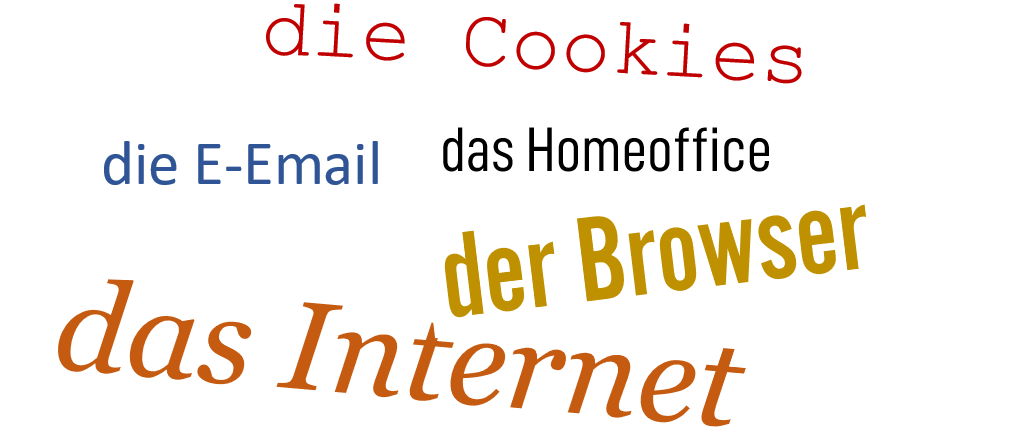The Curiosity of the Word “Homeoffice” Posted by Sten on Jul 23, 2020 in Culture, Language
It’s quarantine time, and so many people are working from home. So you set up your regular office at home – you built yourself a home office! In German, we normally call our office a Büro or Schreibtisch (literally “writing table”). But when working from home, it’s not a Heimbüro, but curiously, a “Homeoffice”. And even if you don’t have an office in your home at all and you just get your work done relaxing on your couch, Germans still call it Homeoffice. How did this seemingly English term creep into the German language? Let’s explore.
Ich arbeite im Homeoffice
In English, you would say “I am working from home” and occasionally that you have a “home office”. However, in German, it is quite common now to say Ich arbeite im Homeoffice (“I am working in the home office”) or even Ich mache Homeoffice (“I do home office”). The Duden gives das Homeoffice, das Home-Office as the only correct ways to write the word, though sometimes you might also see it written as two words (Home Office). Especially to a Brit, this may all sound weird, as in the UK the “Home Office” is a government department.
In German, you could also say Ich arbeite von Zuhause (I am working from home), but Ich mache Homeoffice is easier to say. Another term that more officially refers to the Homeoffice is Telearbeit (“telework”). Here’s how we pronounce it in German:
The German Homeoffice also has a second meaning, equal to the American-English “home office” referring to a work-dedicated room or desk at home.
In any case, the German word can be a real false friend.
So if Germans could have a perfectly fine German word for Homeoffice, how did this seemingly English term become a thing in Germany?
The Dot-Com Bubble?
It is hard to say, and I did not find a lot of information on when the term became popular. However, I think it started in the dot-com bubble in the late 90s. In a newspaper article from August 2000 reviewing an HP device that scans, prints and faxes, the Frankfurter Allgemeine Zeitung (FAZ) wrote: “Im Heimbüro, neumodisch Home-Office genannt, kämpft bisweilen der technische Fortschritt mit seinen vielfältigen Errungenschaften gegen den beschränkten Platz auf oder neben dem Schreibtisch. (In the Heimbüro, also called more modernly the home office, technological progress with its various achievements sometimes fights against the limited space on or next to the desk.) Calling Homeoffice neumodisch is an indication that the word is still quite new, and the author of the article thought it was necessary to mention both the German term Heimbüro and the new term Homeoffice.
So it just seems that Germans thought it would be trendy to use an English term for something computer-related. Computer technology is dominated by the English language that also passed over to the German language (die E-Mail, der Browser, das Internet), and perhaps using English terms makes that differentiation between the “old” Heimbüro and the new Homeoffice that uses computer technology to stay connected. Maybe this is also the case with the English-sounding German noun das Handy (cell phone), which is an evolution from the Mobiltelefon (mobile phone).
But that’s just guesswork. Why do you think that the word Homeoffice gained popularity in Germany? How does your language handle this? Let me know in the comments below!

Build vocabulary, practice pronunciation, and more with Transparent Language Online. Available anytime, anywhere, on any device.






Comments:
Sue Jackel:
I see that the articles for the words die E-Mail, der Browser, das Internet are all different. How does German assign m/f/n to an English word where there are no genders? Danke
Sten:
@Sue Jackel Sharp observation!
Usually, foreign words are given a “das” as an article. I think the exceptions you see here are because a German word preceded them. The German equivalent for E-Mail would be “die elektronische Nachricht” (the electronic message), or “E-Mail-Nachricht”, which got shortened further and further, yet the female article stuck.
Internet is similar, where in Germany, we sometimes also call it “das Netz”, and like I said before, “das” ist the usual article assigned to foreign words.
With Browser, I am not sure. I assume it’s because of its “er”-ending, which oftentimes is an ending for male words of people (der Bauer, der Schlaumeier, der Stöberer, der Hausmeister, etc). Browser probably just sounded too much like that for Germans. Similarly, the anglicism loser is male too: “der Loser”.
Pricebye:
Throughout its development, the lexical composition of the German language has undergone significant changes both under the influence of the outside and as a result of internal phonetic and morphological processes. Earlier meet borrowed vocabulary from Celtic, Latin, French and other European and world languages. In modern times, words are borrowed mainly from the English language, largely reflecting the realities of the Anglo-American global world. This is true for all languages today.